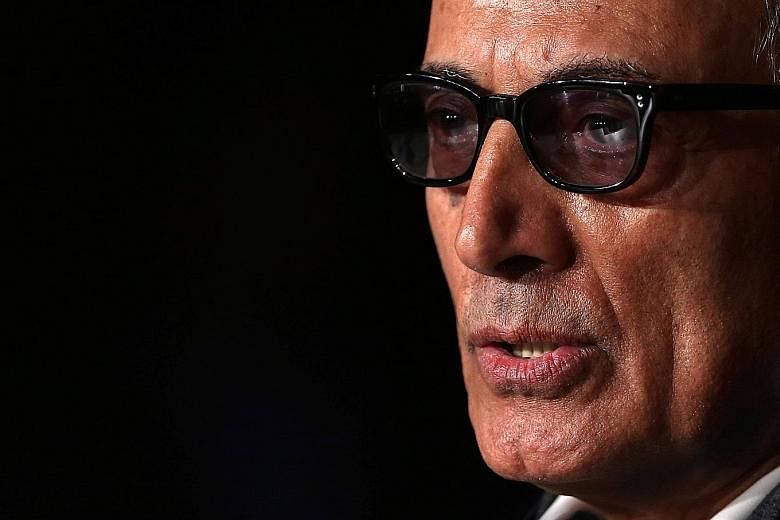NEW YORK • Abbas Kiarostami, often hailed as Iran's greatest film-maker, whose searching, parable-like dramas of ordinary people and their problems reflected a poetic vision and a philosophical turn of mind, died on Monday in Paris. He was 76.
Iran's official news agency said he had travelled there to receive treatment for cancer after undergoing surgery in Teheran.
Kiarostami, loosely associated with the Iranian New Wave of the late 1960s, started out making short films about childhood problems for the Centre for Intellectual Development of Children and Young Adults, where he had established a film-making division. He often worked in a semi-documentary style and used non-professional actors, from whom he coaxed extraordinary performances.
"At the beginning, it was just a job, but it was the making of me as an artist," he told The Guardian in 2005. "The important thing is that I didn't work in commercial films. I look at these 20 years as the best period of my professional life."
He remained in Iran after the 1979 revolution and, never a political film-maker, largely managed to work around the artistic obstacles thrown up by the new government.
He began attracting notice outside Iran with the 1987 feature film Where Is The Friend's House?, about a conscientious schoolboy determined to return a friend's notebook to keep him from being expelled.
Told from its young hero's point of view, it placed the boy's small story in the social context of rural Iran, with sweeping shots of the landscape.
This was the first instalment in the three films called the Koker trilogy, set in the village of that name in northern Iran, rocked by a devastating earthquake that struck in 1990.
Drawn back to the area, Kiarostami made two films dealing with the aftermath of the tragedy, And Life Goes On (1992) and Through The Olive Trees (1994), that marked the director as a major talent in world cinema, whose profoundly rooted realism and compassion drew comparisons to Vittorio De Sica and Satyajit Ray.
In his 1997 film Taste Of Cherry, he told the story of a well-to-do man, identified only as Badii, who, determined to commit suicide, accosts a variety of characters as he looks for a volunteer to bury him. Its acute presentation of moral issues and personal crisis, reminiscent of Ingmar Bergman, deeply impressed critics.
The film won the Palme d'Or at the Cannes Film Festival.
Kiarostami was born on June 22, 1940, in Teheran, where his father was a painter and decorator. After winning a painting contest at 18, he enrolled in the School of Fine Arts at Teheran University, working as a traffic policeman to support himself. He received a bachelor's degree in 1968.
The following year, he married Parvin Amir-Gholi. The marriage ended in divorce. He is survived by their sons, Ahman and Bahman.
In 1977, he made his first feature- length film, Report, about a tax collector who takes bribes.
While he was filming First Case, Second Case, a documentary about a teacher who collectively punishes a class when one pupil refuses to admit wrongdoing, the Iranian Revolution broke out. He had to rethink the film, which nevertheless managed to offend the new regime and was never released.
Unlike many other artists, he chose to remain in Iran. "When you take a tree that is rooted in the ground and transfer it from one place to another, the tree will no longer bear fruit," he told The Guardian. "And if it does, the fruit will not be as good as it was in its original place. This is a rule of nature. I think if I had left my country, I would be the same as the tree."
When he began receiving critical praise in the West, he ran into problems with the Iranian authorities, who often made it difficult for his films to be shown. Conversely, after the attacks on the World Trade Center in 2001, stringent new visa requirements made it impossible for him to attend the premiere of his new film, Ten, at the New York Film Festival in 2002.
Kiarostami, always an idio- syncratic film-maker, became increasingly experimental in his later work. The Wind Will Carry Us (1999), winner of the Grand Jury Prize at the Venice International Film Festival, chronicled a sad engineer's journey to a Kurdish village, relying on multiple characters whose voices are heard but who never appear on camera.
Five (2003) had neither character, plot nor dialogue, consisting of landscape scenes filmed with a hand held camera. In Ten, Kiarostami disappeared as a director, mounting a digital video camera on the dashboard of a car and letting it film the driver as she travelled around Teheran, engaging in conversations with 10 passengers.
In 2010, he made his first film outside Iran, Certified Copy. Filmed in Tuscany, it offered a cryptic account of an encounter between a French antiques dealer, played by Juliette Binoche, and a British writer, played by opera singer William Shimell. His final film, Like Someone In Love, filmed in Japan, was an elliptical study of identity, its main characters a Japanese student moonlighting as a prostitute and her elderly client.
"At a time of war and isolation, when the world thought we were a warmongering country, Kiarostami showed another, peaceful face of Iran," professor and journalist Mehrdad Hodjati said in an interview. "He is an icon of change in Iran."
NEW YORK TIMES

